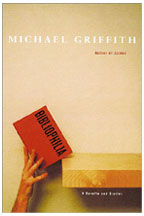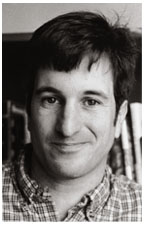February 11, 2004: Reading Room
|
Michael Griffith ’87 went from advertising copywriter to “formidable literary talent.” (Jon hughes/Photopresse) |
Hanky
panky in the stacks
Michael Griffith ’87’s stories takes a zany look at characters
in unlikely situations
By Maria LoBiondo
For his second book, Michael Griffith ’87 has created a carnival of characters ensnared in comic situations: A hair doctor who goes bald. An English professor trapped in a monkey cage. A librarian who polices the stacks for chastity’s sake.
Bibliophilia: A Novella and Stories, published by Arcade last summer, takes readers on a zany jaunt through situations that seem at once ludicrous and possible.
“The pleasure of writing is imagining oneself into someone else’s skin and context, making a leap of empathetic imagination. I try to think my way into a person’s circumstances, way of speaking, and thinking,” says Griffith, who teaches English and comparative literature at the University of Cincinnati.
The title story, set in Louisiana, features Myrtle, a postmenopausal librarian hired to stalk the library’s stacks searching for students taking advantage of the dark and quiet to indulge in sexual escapades. Myrtle befriends Seti, an Egyptian exchange student who works at the circulation desk. Myrtle eventually needs Seti’s help — leading both to a surprising reevaluation of themselves and each other.
 “It’s
about the nexus between two kinds of book-love: love for books and love
among books,” says Griffith, who was inspired in part by a Princeton
roommate who had a passion for perusing the riches of Firestone’s
stacks.
“It’s
about the nexus between two kinds of book-love: love for books and love
among books,” says Griffith, who was inspired in part by a Princeton
roommate who had a passion for perusing the riches of Firestone’s
stacks.
A Germanic languages and literatures major at Princeton, Griffith took a creative writing course with Joyce Carol Oates as a sophomore and “was terrified. I came out thinking I didn’t have the tools” to be a writer, he says.
But a week after the semester ended, Oates sent Griffith an encouraging note about his writing ability. After graduation and a stint writing advertising copy in New York City — which he hated — that note, which he kept, helped prompt him to try creative writing again. He earned an M.F.A. in creative writing at Louisiana State University, started writing short fiction and essays for literary journals, and worked for 10 years as an editor for the literary quarterly The Southern Review. His first novel, Spikes, published in 2001, received favorable reviews, as did Bibliophilia. Publishers Weekly called Griffith “a formidable literary talent.”
A native South Carolinian, Griffith is not surprised to be asked if he considers himself a Southern writer. “Yes and no,” he says, adding it’s not the nostalgic South that he focuses on. “I’m more interested in the polyglot, multiracial new South, and the pressures and changes over the last 50 years.”
And although he acknowledges models in Southern writers like Flannery O’Connor and Walker Percy, his deepest influence is the Russian-born American novelist and poet Vladimir Nabokov. For Nabokov, as for Griffith, literature is play, albeit play of a high order. Griffith asks, “If a writer is not taking pleasure, how is a reader going to?”
Griffith recently received a National Endowment of the Arts fellowship,
which he plans to use to work on his next book about a band of grammar
“terrorists” who root out people who use incorrect grammar.
![]()
Maria LoBiondo is an occasional contributor to PAW.
Book Shorts
 The Gravest
Danger: Nuclear Weapons — SIDNEY D. DRELL ’47 and James
E. Goodby (Hoover Institution). The authors review policy issues surrounding
the nonproliferation of nuclear weapons and suggest actions that nations,
under American leadership, should take to contain and reduce the danger
of nuclear weapons, such as preventive military action. Drell is a professor
emeritus of theoretical physics at Stanford’s Linear Accelerator
Center.
The Gravest
Danger: Nuclear Weapons — SIDNEY D. DRELL ’47 and James
E. Goodby (Hoover Institution). The authors review policy issues surrounding
the nonproliferation of nuclear weapons and suggest actions that nations,
under American leadership, should take to contain and reduce the danger
of nuclear weapons, such as preventive military action. Drell is a professor
emeritus of theoretical physics at Stanford’s Linear Accelerator
Center.
 A Century of
Innovation: Twenty Engineering Achievements that Transformed Our Lives
— GEORGE CONSTABLE ’63 and BOB SOMERVILLE ’78 (Joseph Henry).
A Century of Innovation profiles what the authors consider the most significant
inventions, including electricity, the automobile, and the Internet. For
each item, the authors give a history, an illustrated explanation of how
it works, and a timeline tracing its evolution. Constable is a freelance
writer and editor. Somerville, also a freelancer, worked for 20 years
at Time-Life Books.
A Century of
Innovation: Twenty Engineering Achievements that Transformed Our Lives
— GEORGE CONSTABLE ’63 and BOB SOMERVILLE ’78 (Joseph Henry).
A Century of Innovation profiles what the authors consider the most significant
inventions, including electricity, the automobile, and the Internet. For
each item, the authors give a history, an illustrated explanation of how
it works, and a timeline tracing its evolution. Constable is a freelance
writer and editor. Somerville, also a freelancer, worked for 20 years
at Time-Life Books.
 A Time of
Our Choosing: America’s War in Iraq — TODD S. PURDUM ’82
and the staff of the New York Times (Times Books). Using his own reporting
and New York Times interviews with key figures, Times correspondent Todd
Purdum tells a comprehensive story of the war in Iraq. The book outlines
Donald Rumsfeld ’54’s war plan, the diplomatic recriminations
at the U.N., and specific battles. Purdum is a correspondent in the Washington
bureau of the Times and chair of PAW’s board of directors.
A Time of
Our Choosing: America’s War in Iraq — TODD S. PURDUM ’82
and the staff of the New York Times (Times Books). Using his own reporting
and New York Times interviews with key figures, Times correspondent Todd
Purdum tells a comprehensive story of the war in Iraq. The book outlines
Donald Rumsfeld ’54’s war plan, the diplomatic recriminations
at the U.N., and specific battles. Purdum is a correspondent in the Washington
bureau of the Times and chair of PAW’s board of directors. ![]()
By Lucia S. Smith ’04 and K.F.G.

